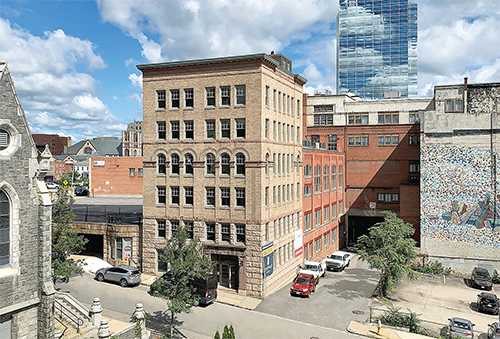 Tax Incentives Play Major Role in Financing Project
Tax Incentives Play Major Role in Financing Project
By Christopher R. Vaccaro
Special to Banker & Tradesman
“. . . those who a good deed offer shall reap three times over the good deed that they offer”
Ifeanyi Menkiti published this verse in 2007 as part of his poem “They will Rise.” At the time, the Nigerian immigrant, poet, philosopher, and Wellesley College professor probably was not thinking about commercial real estate investment.
However, his verse became prophetic for a real estate project that began with his 2015 purchase of a vacant historic building at 6-8 Chatham St. in Worcester. Dr. Menkiti passed away in 2019 and did not live to see the completion of the project, but his dream of redeveloping that property reaped three significant tax benefits for The Menkiti Group, his son Bo’s real estate development firm.

The Menkiti Group completed the Chatham Lofts project and opened it for leasing last December. The project contains 24 luxury rental units with a fitness center, community room, and parking. It leased-up quickly, with several units occupied by members of the Worcester Red Sox minor league baseball club.
HDIP, Historic Credits and More
The Menkiti Group utilized three tax incentives in creating Chatham Lofts. The first was obtained through the Massachusetts Housing Development Incentive Program (HDIP), which is available in “Gateway Cities,” such as Worcester, that have 35,000 to 250,000 residents and median household incomes and college graduation rates below the state average.
Chatham Lofts is within an “HD zone” approved under the HDIP by the Massachusetts Department of Housing and Community Development (DHCD) for multi-unit, market-rate housing. As a result, The Menkiti Group secured a 10-year exemption of 60 percent of the increased value from its rehabilitation of the property. In addition to reduced real estate taxes, projects certified by DHCD qualify for state income tax credits of up to 25 percent of construction costs.
Federal and state historic tax credits were the second tax incentive that made Chatham Lofts possible. The Menkiti Group employed sensitive restoration processes so that the National Park Service and Massachusetts Historical Commission listed the property on the National Register of Historic Places. As a result, many project costs were “qualified rehabilitation expenditures,” for which The Menkiti Group earned a federal tax credit of $1.6 million and state tax credits of $1.35 million.
The third tax incentive came from the federal Tax Cuts and Jobs Act of 2017, which established “opportunity zones” with reduced federal capital gains taxes. Chatham Lofts is within one of the 138 designated opportunity zones in Massachusetts.Opportunity zone tax benefits are complicated, but if properly utilized, investors can enjoy deferred capital gains taxes, a 10 percent step-up in basis if the investor holds the investment for at least five years before December 21, 2026, and a 100-percent step up in basis if the investor holds the investment for at least 10 years (but not beyond 2047).
A Potential Triple-Play in Tax Deferrals
Consider a hypothetical taxpayer who sold investment property in 2020, realizing a $1 million capital gain, and then within 180 days reinvested the $1 million into a “Qualified Opportunity Fund” (QOF) developing investment property in an opportunity zone. By reinvesting in the QOF, the taxpayer can defer paying federal taxes on the gain until the sale of the QOF investment, or Dec. 31, 2026, whichever occurs first.
Also, because the QOF investment was made before 2022, if the taxpayer holds the investment for at least five years, the taxpayer enjoys a 10 percent step-up in basis. Finally, if the taxpayer holds the QOF investment for at least 10 years (but not beyond 2047), the taxpayer pays no federal capital gains tax on the appreciation of the investment beyond the deferred capital gain!
The opportunity zone program has sunset provisions. The 10-percent step up in basis is unavailable for QOF investments made after 2021, and no tax benefits are available for reinvested capital gains realized after 2026. However, the Chatham Lofts development was completed in 2021, so it can enjoy all of the tax advantages of opportunity zone investments described above.
Bo Menkiti sums up his firm’s mission best: “We believe every neighborhood has something that makes it great, and that core belief has been clearly illuminated through our experience in Worcester. We approach every neighborhood with the goal of highlighting existing assets and shining a light on the potential within, and financing tools such as historic tax credits, DHCD’s HDIP, and the Opportunity Zone program allow us to do so. These tax incentives are necessary to make these impactful projects possible. My father saw the great potential that exists in Worcester, and we are honored to continue his legacy, one that serves as a guiding light for our purpose and mission in the city today.”
Download the article as seen in Banker & Tradesman on June 27, 2022. Learn more about Christopher R. Vaccaro.